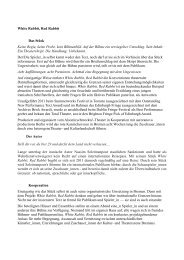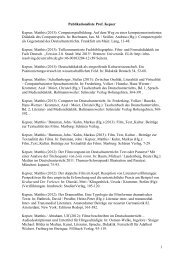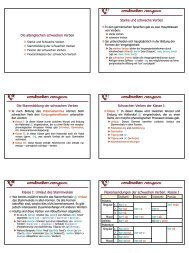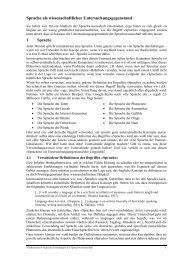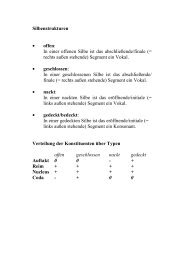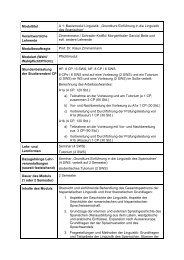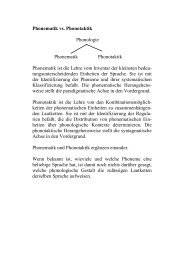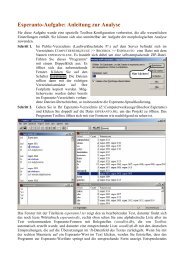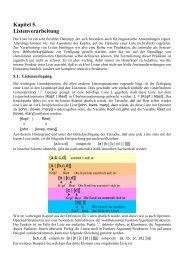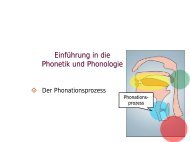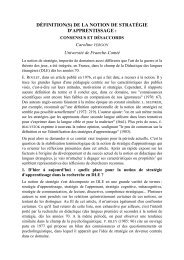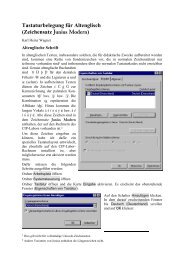Relativism and Universalism in Linguistics - Fachbereich 10 ...
Relativism and Universalism in Linguistics - Fachbereich 10 ...
Relativism and Universalism in Linguistics - Fachbereich 10 ...
Create successful ePaper yourself
Turn your PDF publications into a flip-book with our unique Google optimized e-Paper software.
Workshop 5 – Gro 181<br />
Left-Peripheral Interactions <strong>in</strong> Sard<strong>in</strong>ian<br />
Remberger, Eva-Maria<br />
Berl<strong>in</strong><br />
eremberg@l<strong>in</strong>grom.fu-berl<strong>in</strong>.de<br />
Concern<strong>in</strong>g the phenomena commonly attributed to the left periphery, Sard<strong>in</strong>ian does not differ<br />
from Romance languages like Italian <strong>and</strong> Spanish with respect to clitic left dislocated topics,<br />
right dislocation, contrastive focus <strong>and</strong> wh-<strong>in</strong>terrogatives. However, <strong>in</strong> Sard<strong>in</strong>ian, there are<br />
some crucial differences <strong>in</strong> the organization of the left periphery compared to Italian or Spanish:<br />
First, whereas contrastive focus constructions <strong>in</strong> these languages show non-predicative, i.e.<br />
referential fronted constituents, Sard<strong>in</strong>ian also allows fronted predicative elements, e.g. <strong>in</strong><br />
auxiliary constructions. Second, a fronted element <strong>in</strong> Sard<strong>in</strong>ian must not necessarily have<br />
contrastive focus, but can also be <strong>in</strong>terpreted as hav<strong>in</strong>g <strong>in</strong>formation focus. Third, these front<strong>in</strong>g<br />
phenomena are not only found <strong>in</strong> declarative sentences, but also <strong>in</strong> subord<strong>in</strong>ate complement<br />
sentences. Furthermore, front<strong>in</strong>g of predicative <strong>and</strong> non-predicative elements is particularly<br />
common <strong>in</strong> yes/no questions. Forth, Sard<strong>in</strong>ian disposes of an alternative strategy to mark<br />
yes/no-questions via the question particle a. F<strong>in</strong>ally, neither focus front<strong>in</strong>g nor questionmark<strong>in</strong>g<br />
through the question particle are allowed <strong>in</strong> wh- <strong>and</strong> <strong>in</strong> negated contexts.<br />
Thus, the ma<strong>in</strong> issue to be addressed <strong>in</strong> this talk is how the <strong>in</strong>teraction between focus front<strong>in</strong>g,<br />
question-mark<strong>in</strong>g, negation <strong>and</strong> also topicalization can be formalized <strong>and</strong> expla<strong>in</strong>ed <strong>in</strong> a given<br />
grammar model. I will <strong>in</strong>terpret the data from Sard<strong>in</strong>ian <strong>in</strong> the more static cartographic<br />
framework of Rizzi (1997) <strong>and</strong>, as an alternative, <strong>in</strong> the dynamic model of the ma<strong>in</strong>ly featuredriven<br />
m<strong>in</strong>imalist probe-<strong>and</strong>-phase approach (Chomsky 1995ff.).<br />
Select<strong>in</strong>g Complementizers<br />
Roussou, Anna<br />
Patras<br />
aroussou@upatras.gr<br />
The aim of this paper is to discuss local <strong>and</strong> non-local selection of complementizers (C).<br />
Typically, a verb like know is compatible with a that-complement, <strong>and</strong> excludes an ifcomplement<br />
(embedded <strong>in</strong>terrogative) (e.g. I know that/*if John left). In some cases though<br />
the same verb may allow for the presence of the C if, as long as there is a propositional<br />
operator <strong>in</strong> the matrix clause (e.g. I don’t know if John left). This k<strong>in</strong>d of restrictions <strong>and</strong><br />
switch<strong>in</strong>g effects hold not only English, but also <strong>in</strong> Greek <strong>and</strong> Romance for example (Adger<br />
& Quer 2001, Roussou 2006). Romance allows for one further option, namely keep<strong>in</strong>g the<br />
non-<strong>in</strong>terrogative C que but chang<strong>in</strong>g the mood of the embedded clause from <strong>in</strong>dicative to<br />
subjunctive (Adger & Quer 2001, Manz<strong>in</strong>i 2002, among others). This option is not available<br />
<strong>in</strong> Greek given the absence of morphological subjunctive.<br />
A more detailed <strong>in</strong>vestigation of the distribution of complementizers reveals that despite<br />
apparent differences, sentential complementation exhibits a uniform pattern. More precisely,<br />
<strong>in</strong> English, Greek, <strong>and</strong> Romance switch<strong>in</strong>g to a different C is a function of the matrix<br />
predicate (it belongs to a certa<strong>in</strong> class) <strong>and</strong> the presence of a relevant operator <strong>in</strong> the matrix<br />
clause. In all cases local selection <strong>in</strong>volves a dependency between matrix V <strong>and</strong> embedded C<br />
(or extend<strong>in</strong>g to I where relevant), while <strong>in</strong> non-local selection the dependency is extended to<br />
<strong>in</strong>clude an operator. Furthermore, switch<strong>in</strong>g effects of this type are <strong>in</strong>dicative of the properties<br />
that characterize complementizers. For example, as has been argued <strong>in</strong> the literature cited<br />
above, operators like Negation or Question also license polarity items (<strong>in</strong>def<strong>in</strong>ites). On this<br />
basis, the subjunctive that appears <strong>in</strong> the relevant Romance contexts is treated as a polarity<br />
item, i.e. an <strong>in</strong>def<strong>in</strong>ite. Extend<strong>in</strong>g this approach to Cs which may also be affected, we can also



